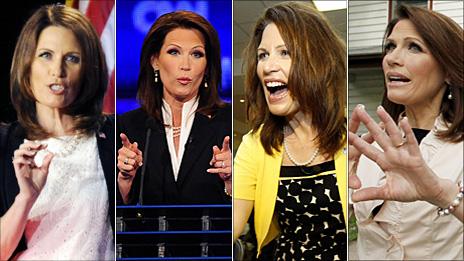Profile: Michele Bachmann
- Published

Michele Bachmann was an outspoken favourite of the Tea Party who rose to prominence with her strident cable television attacks on President Barack Obama and the Democrats.
Her ability to whip a crowd into a lather and her blend of evangelical Christian social conservatism and fierce Tea Party anti-tax rhetoric propelled her to the top tier of the Republican primary race back in the summer.
But she was soon eclipsed by Rick Perry, then by Herman Cain, then by Newt Gingrich and finally by Rick Santorum, as restive Republican voters auditioned one candidate after another to challenge front-runner Mitt Romney from the right.
She suspended her cash-strapped campaign after finishing sixth in January 2012's first-in-the-nation Iowa caucuses, attracting only 5% of the vote.
Discovering God
Michele Amble was born in Waterloo, Iowa, to Democratic-supporting parents of Norwegian descent, but she was brought up by her mother in Anoka, Minnesota, with three brothers, after her mother's divorce.
Michele Bachmann announces her candidacy for the 2012 presidential election
She discovered God at the age of 16 when, in her own words, "people were coming to the Lord left and right." After graduating from a law school in Oklahoma, she studied for a degree in tax law in Virginia.
She worked for the Internal Revenue Service for five years and then left her job to become a full-time mother when she had her fourth child, before pursuing a political career.
She and husband Marcus Bachmann have five children and have fostered 23 young women, facts Mrs Bachmann mentioned frequently on the campaign trail.
"I think Michele Bachmann is the total package," said Ralph Reed, chairman of the Faith and Freedom Coalition.
"She offers that unique combination that really captures the zeitgeist, which is a marriage of the social conservative and Tea Party activist."
This broad constituency of self-identified Christian evangelicals and their social conservative allies makes up about 41% of Republican primary voters, says Mr Reed.
'A flake?'
Mrs Bachmann has got herself into trouble with past remarks, to the extent that Fox News presenter Chris Wallace once asked her: "Are you a flake?" He later apologised.
There have been several gaffes, like declaring while in New Hampshire that it was the birthplace of the American Revolution, and that the founding fathers worked tirelessly to end slavery (many owned slaves).
And some controversial statements, such as the time in 2008 when she accused Barack Obama, then a senator for Illinois, of having anti-American views.
But her consummate performance in early debates this campaign marked the emergence of a more disciplined operator, says Larry Jacobs, a professor in political science at the University of Minnesota.
Mr Jacobs, who has met Mrs Bachmann about a dozen times, describes her as very engaging in person and smarter than the media portrayals depict her.
"Her brand of conservative populism speaks to the resentments, frustrations and anxieties of voters. She also has a clear identity. Some of the other candidates, like Mitt Romney, it's hard to say what he believes in."
She also has a more intangible gift - to electrify a crowd - says Arne Carlson, who served as Republican governor in Minnesota when Ms Bachmann was in the state legislature.
"She has the ability to instantly feel an audience and to relate to that audience. And she represents a strain in American thought that Washington and New York don't understand.
"In the Midwest, there's a very deep suspicion of Wall Street and she plays to that."
But the best candidates don't make the most suitable people for governance, Arne Carlson says. Michele Bachmann sees America in very nostalgic terms, he notes - everyone goes to church, everybody has a job and everybody shares the same civic and religious values.
This plays to a narrow base, while the urban, racial or religious diversity of America is not acknowledged, Mr Carlson says. He contends that beneath the surface of her politics, there are some clear flaws.
"The utilisation of the Bible to tell you what's constitutional and what isn't. That's very disturbing," he says, describing her ideology as a no-compromise approach to the debt ceiling, taxes and social issues.
- Published27 June 2011
- Published28 May 2011
- Published3 January 2012